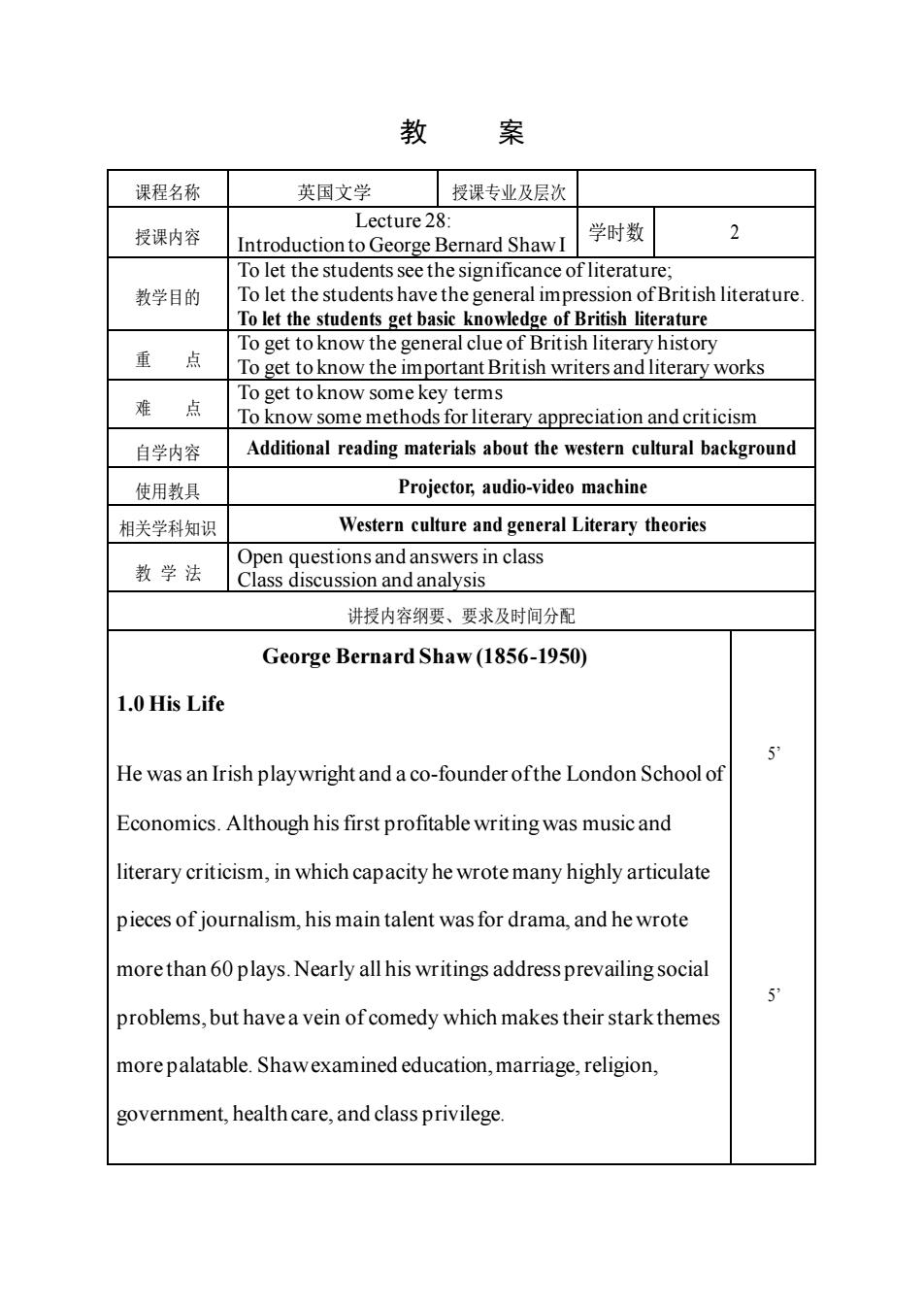
教 案 课程名称 英因文学 授课专业及层次 授课内容 Lecture 28: Introduction to George Bernard Shaw I 学时数 2 To let the students see the significance of literature; 教学目的 To let the students ha avethe sion of British literature To let the students get basic knowledge of British literature 重点 To get to know the general clue of British literary history To get to know the important British writers and literary works 难点 To get to know some key terms 自学内容 Additional reading materials about the western cultural background 使用教具 Projector,audio-video machine 相关学科知识 Western culture and general Literary theories Open questions and answers in class 教学法Class discussion and analysis 讲授内容纲要、要求及时间分配 George Bernard Shaw(1856-1950) 1.0 His Life He was an Irish playwright and a co-founder ofthe London School of Economics.Although his first profitable writing was music and literary criticism,in which capacity he wrote many highly articulate pieces of journalism,his main talent was for drama,and he wrote more than 60 plays.Nearly all his writings address prevailing social 5 problems,but havea vein of comedy which makes their starkthemes more palatable.Shawexamined education,marriage,religion, government,health care,and class privilege
教 案 课程名称 英国文学 授课专业及层次 授课内容 Lecture 28: Introduction to George Bernard Shaw I 学时数 2 教学目的 To let the students see the significance of literature; To let the students have the general impression of British literature. To let the students get basic knowledge of British literature 重 点 To get to know the general clue of British literary history To get to know the important British writers and literary works 难 点 To get to know some key terms To know some methods for literary appreciation and criticism 自学内容 Additional reading materials about the western cultural background 使用教具 Projector, audio-video machine 相关学科知识 Western culture and general Literary theories 教 学 法 Open questions and answers in class Class discussion and analysis 讲授内容纲要、要求及时间分配 George Bernard Shaw (1856-1950) 1.0 His Life He was an Irish playwright and a co-founder of the London School of Economics. Although his first profitable writing was music and literary criticism, in which capacity he wrote many highly articulate pieces of journalism, his main talent was for drama, and he wrote more than 60 plays. Nearly all his writings address prevailing social problems, but have a vein of comedy which makes their stark themes more palatable. Shaw examined education, marriage, religion, government, health care, and class privilege. 5’ 5’
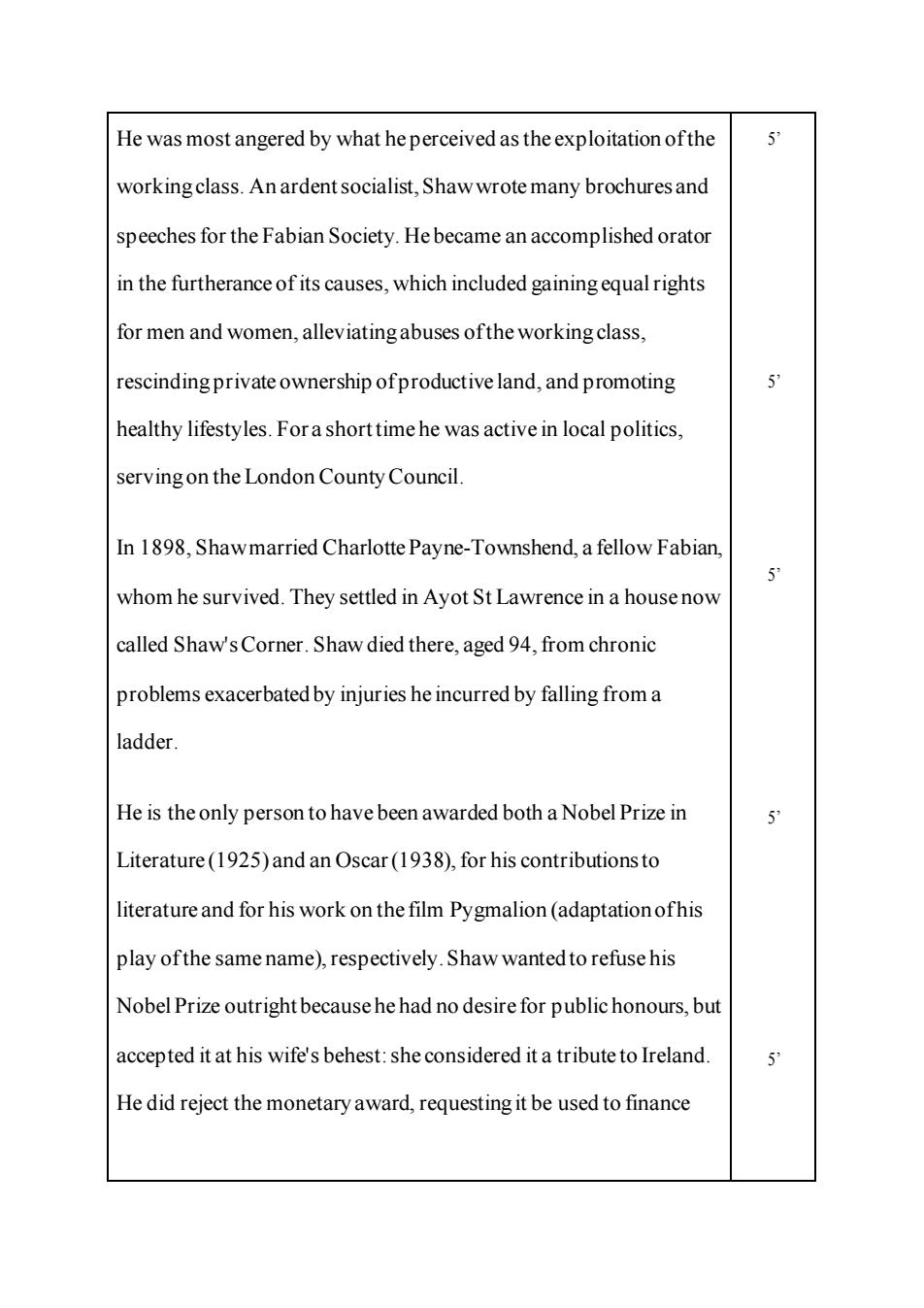
He was most angered by what he perceived as the exploitation ofthe 5 workingclass.An ardent socialist,Shaw wrote many brochures and speeches for the Fabian Society.He became an accomplished orator n the furtherance of its causes,which included gainingequal rights for men and women,alleviating abuses ofthe working class, rescinding private ownership ofproductive land,and promoting 5 healthy lifestyles.Fora shorttime he was active in local politics. serving on the London County Council. In 1898,Shawmarried Charlotte Payne-Townshend,a fellow Fabian. 5 whom he survived.They settled in Ayot St Lawrence in a house now called Shaw's Corner.Shaw died there,aged 94,from chronic problems exacerbated by injuries he incurred by falling from a ladder. He is the only person to have been awarded both a Nobel Prize in Literature(1925)and an Oscar(1938),for his contributions to literature and for his work on the film Pygmalion (adaptation ofhis play ofthe same name),respectively.Shaw wanted to refuse his Nobel Prize outright because he had no desire for public honours,but accepted it at his wife's behest:she considered it a tribute to Ireland. 5 He did reject the monetary award,requesting it be used to finance
He was most angered by what he perceived as the exploitation of the working class. An ardent socialist, Shaw wrote many brochures and speeches for the Fabian Society. He became an accomplished orator in the furtherance of its causes, which included gaining equal rights for men and women, alleviating abuses of the working class, rescinding private ownership of productive land, and promoting healthy lifestyles. For a short time he was active in local politics, serving on the London County Council. In 1898, Shaw married Charlotte Payne-Townshend, a fellow Fabian, whom he survived. They settled in Ayot St Lawrence in a house now called Shaw's Corner. Shaw died there, aged 94, from chronic problems exacerbated by injuries he incurred by falling from a ladder. He is the only person to have been awarded both a Nobel Prize in Literature (1925) and an Oscar(1938), for his contributions to literature and for his work on the film Pygmalion (adaptation of his play of the same name), respectively. Shaw wanted to refuse his Nobel Prize outright because he had no desire for public honours, but accepted it at his wife's behest: she considered it a tribute to Ireland. He did reject the monetary award, requesting it be used to finance 5’ 5’ 5’ 5’ 5’
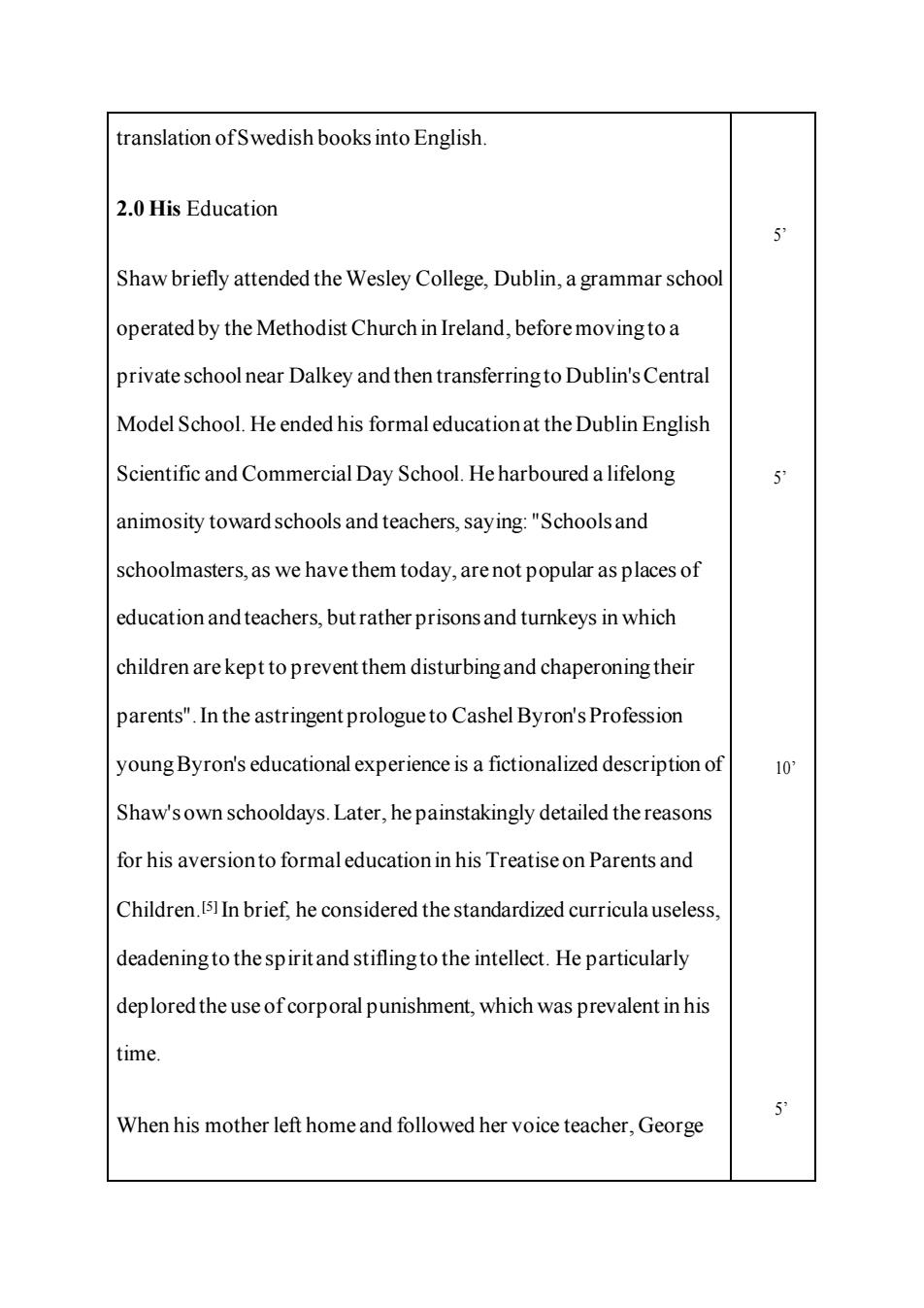
translation ofSwedish books into English 2.0 His Education Shaw briefly attended the Wesley College.Dublin,a grammar school operated by the Methodist Church in Ireland,before movingto a private school near Dalkey and then transferring to Dublin's Central Model School.He ended his formal educationat the Dublin English Scientifie and Commercial Day School.He harboured a lifelong animosity toward schools and teachers,saying:"Schools and schoolmasters,as we have them today,arenot popular as places of education and teachers,but rather prisons and turnkeys in which children are kept to prevent them disturbing and chaperoning their parents"In the astringent prologuetoCashel Byron's Profession young Byron's educational experience is a fictionalized description of 10 Shaw'sown schooldays.Later,he painstakingly detailed the reasons for his aversionto formaleducation in his Treatiseon Parents and Children.I5]In brief,he considered the standardized curriculauseless. deadeningto thespiritand stiflingto the intellect.He particularly deplored the use of corporal punishment,which was prevalent in his time. 5 When his mother left home and followed her voice teacher,George
translation of Swedish books into English. 2.0 His Education Shaw briefly attended the Wesley College, Dublin, a grammar school operated by the Methodist Church in Ireland, before moving to a private school near Dalkey and then transferring to Dublin's Central Model School. He ended his formal education at the Dublin English Scientific and Commercial Day School. He harboured a lifelong animosity toward schools and teachers, saying: "Schools and schoolmasters, as we have them today, are not popular as places of education and teachers, but rather prisons and turnkeys in which children are kept to prevent them disturbing and chaperoning their parents". In the astringent prologue to Cashel Byron's Profession young Byron's educational experience is a fictionalized description of Shaw's own schooldays. Later, he painstakingly detailed the reasons for his aversion to formal education in his Treatise on Parents and Children. [5] In brief, he considered the standardized curricula useless, deadening to the spirit and stifling to the intellect. He particularly deplored the use of corporal punishment, which was prevalent in his time. When his mother left home and followed her voice teacher, George 5’ 5’ 10’ 5’
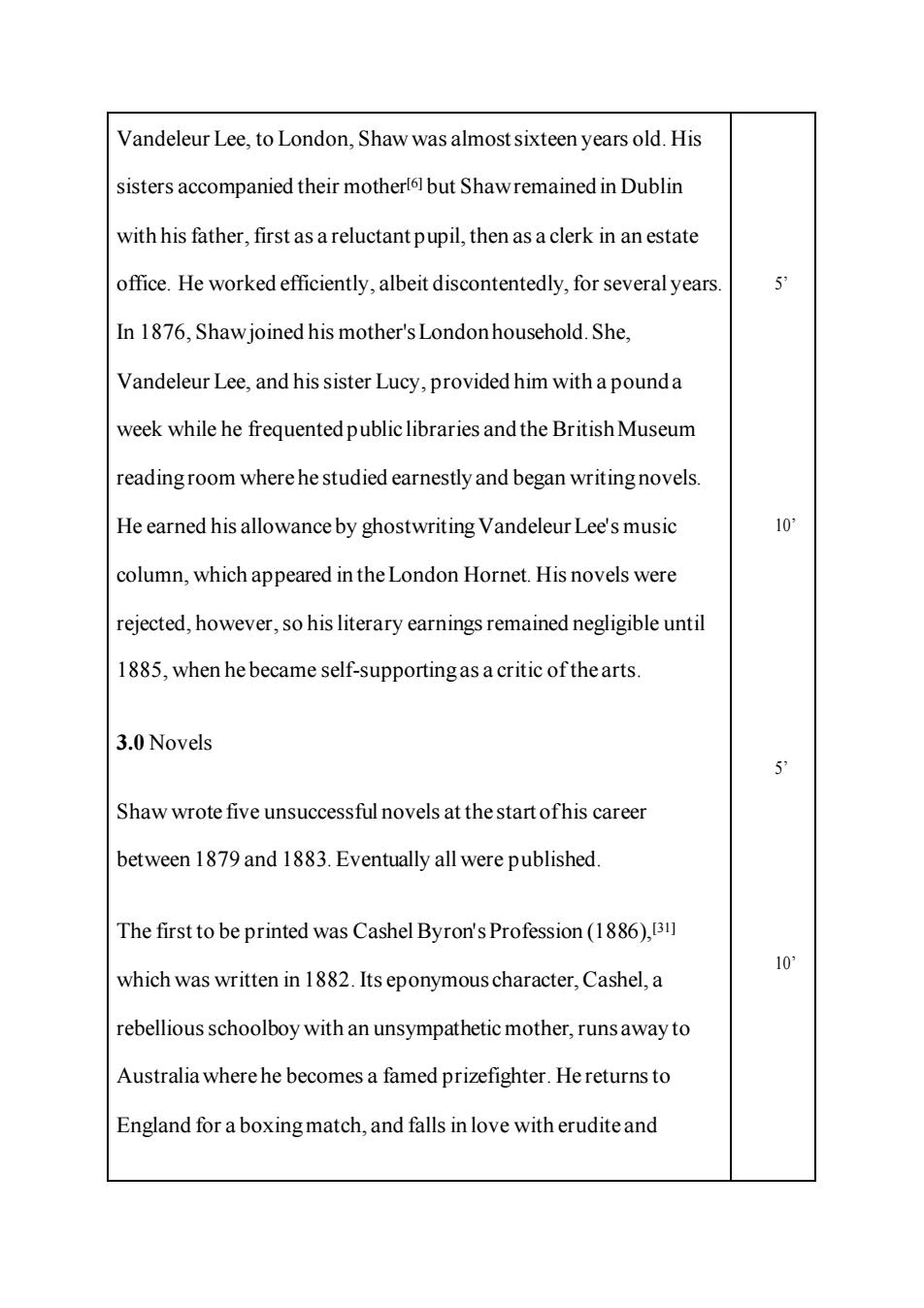
Vandeleur Lee,to London,Shaw was almost sixteen years old.His sisters accompanied their mothert1 but Shawremained in Dublin with his father,first as a reluctant pupil,then as a clerk in an estate office.He worked efficiently,albeit discontentedly,for severalyear 5° In 1876,Shaw joined his mother's London household.She, Vandeleur Lee,and his sister Lucy,provided him with a pounda week while he frequented public libraries and the British Museum reading room where he studied earnestly and began writing novels. He earned his allowance by ghostwriting Vandeleur Lee's music 10 column,which appeared in the London Hornet.His novels were rejected,however,so his literary earnings remained negligible until 1885,when he became self-supportingas a critic of the arts. 3.0 Novels 5 Shaw wrote five unsuccessful novels at the start ofhis career between 1879 and 1883.Eventually all were published The first to be printed was Cashel Byron's Profession(1886),1 10 which was written in 1882.Its eponymouscharacter,Cashel,a rebellious schoolboy with an unsympathetic mother,runs away to Australia where he becomes a famed prizefighter.He returns to England for a boxing match,and falls in love with erudite and
Vandeleur Lee, to London, Shaw was almost sixteen years old. His sisters accompanied their mother[6] but Shaw remained in Dublin with his father, first as a reluctant pupil, then as a clerk in an estate office. He worked efficiently, albeit discontentedly, for several years. In 1876, Shaw joined his mother's London household. She, Vandeleur Lee, and his sister Lucy, provided him with a pound a week while he frequented public libraries and the British Museum reading room where he studied earnestly and began writing novels. He earned his allowance by ghostwriting Vandeleur Lee's music column, which appeared in the London Hornet. His novels were rejected, however, so his literary earnings remained negligible until 1885, when he became self-supporting as a critic of the arts. 3.0 Novels Shaw wrote five unsuccessful novels at the start of his career between 1879 and 1883. Eventually all were published. The first to be printed was Cashel Byron's Profession (1886),[31] which was written in 1882. Its eponymous character, Cashel, a rebellious schoolboy with an unsympathetic mother, runs away to Australia where he becomes a famed prizefighter. He returns to England for a boxing match, and falls in love with erudite and 5’ 10’ 5’ 10’
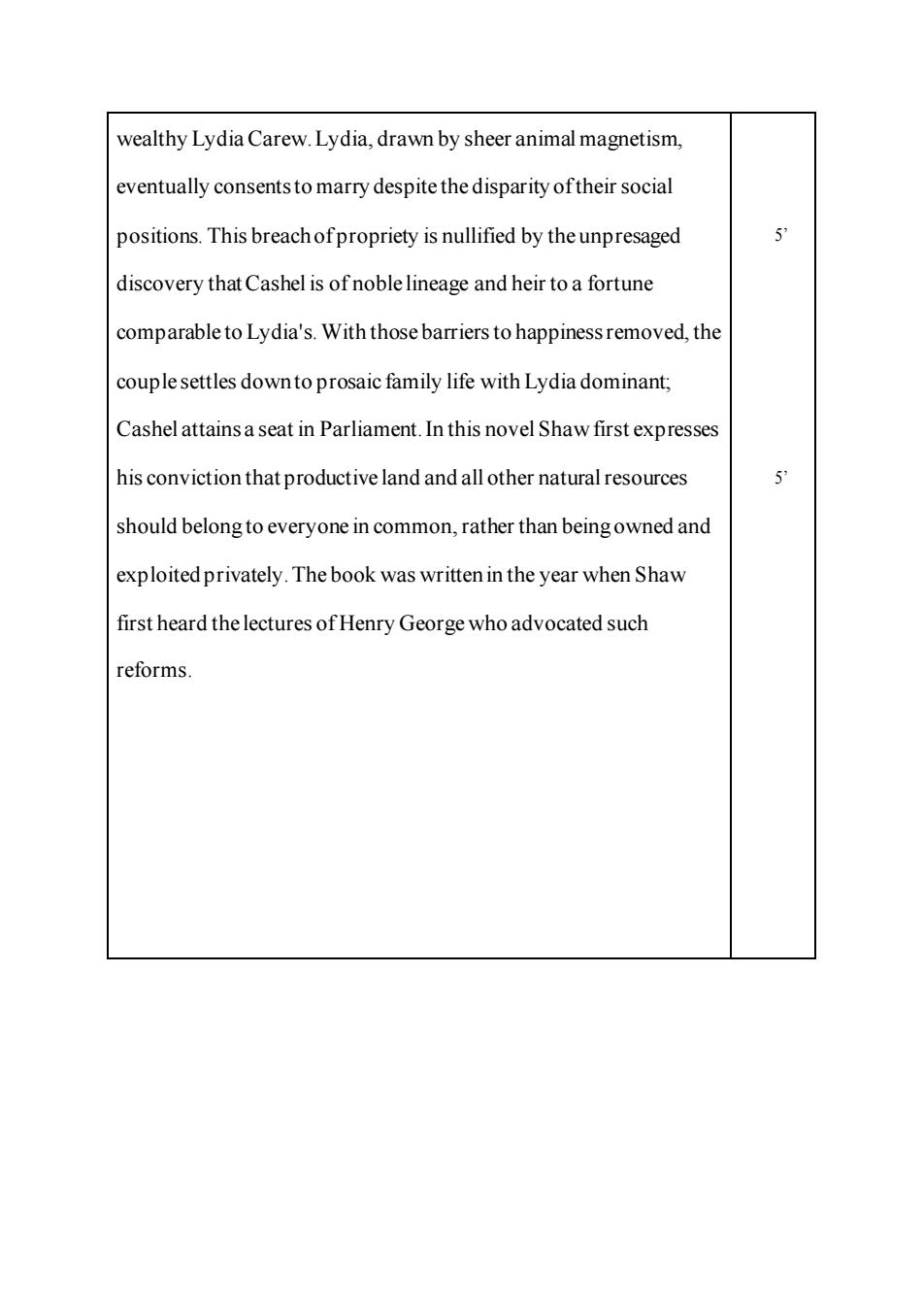
wealthy Lydia Carew.Lydia,drawn by sheer animal magnetism, eventually consentsto marry despite the disparity oftheir social positions This breachofpropriety isnulifed by theunpresaged 5 discovery that Cashel is ofnoble lineage and heir to a fortune comparable to Lydia's.With those barriers to happiness removed,the couple settles downto prosaic family life with Lydia dominant. Cashel attainsa seat in Parliament.In this novel Shaw first expresses his conviction that productive land and all other natural resources should belong to everyone in common,rather than being owned and exploited privately.The book was written in the year when Shaw first heard the lectures of Henry George who advocated such eforms
wealthy Lydia Carew. Lydia, drawn by sheer animal magnetism, eventually consents to marry despite the disparity of their social positions. This breach of propriety is nullified by the unpresaged discovery that Cashel is of noble lineage and heir to a fortune comparable to Lydia's. With those barriers to happiness removed, the couple settles down to prosaic family life with Lydia dominant; Cashel attains a seat in Parliament. In this novel Shaw first expresses his conviction that productive land and all other natural resources should belong to everyone in common, rather than being owned and exploited privately. The book was written in the year when Shaw first heard the lectures of Henry George who advocated such reforms. 5’ 5’
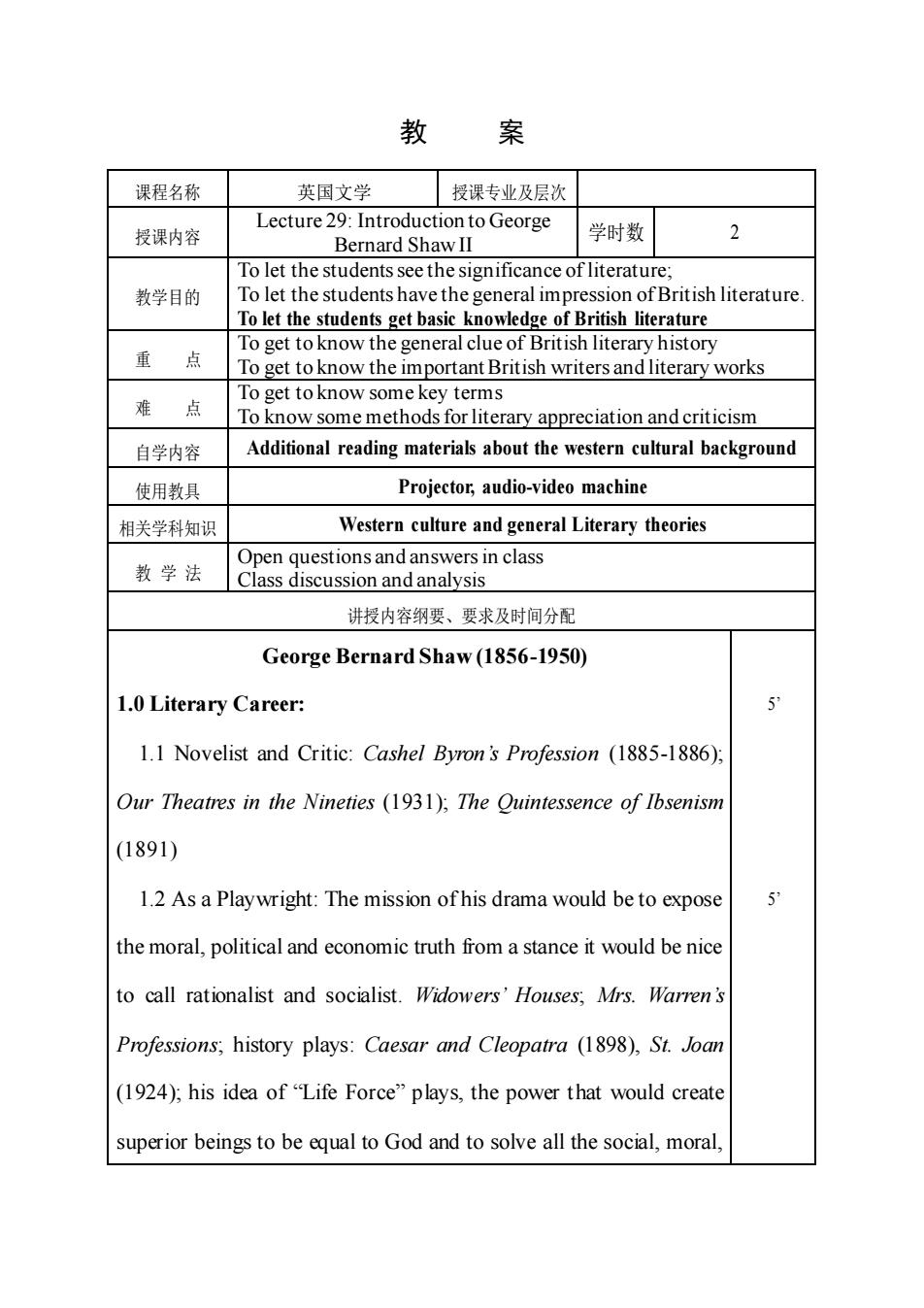
教 案 课程名称 英国文学 授课专业及层次 授课内容 Lecture 29:Introduction to George 学时数 Bernard shaw ii 2 To let the students see the significance ofliterature 教学目的 Toe the students havethe general im ssion of British literature Toet the studenget basic knowedge ofBritish 重点 To get to know the general clue of British literary history To get to know the important British writers and literary works 难点 To get to know some key terms 自学内容 Additional reading materials about the western cultural background 使用教具 Projector,audio-video machine 相关学科知识 Western culture and general Literary theories Open questions and answers in class 教学法Class discussion and analysis 讲授内容纲要、要求及时间分配 George Bernard Shaw(1856-1950) 1.0 Literary Career: 1.1 Novelist and Critic:Cashel Byron's Profession (1885-1886). Our Theatres in the Nineties(1931);The Quintessence of Ibsenism (1891) 1.2 As a Playwright:The mission of his drama would be to expose the moral,political and economic truth from a stance it would be nice to call rationalist and socialist.Widowers'Houses,Mrs.Warren's Professions,history plays:Caesar and Cleopatra (1898),St.Joan (1924);his idea of"Life Force"plays,the power that would create superior beings to be equal to God and to solve all the social,moral
教 案 课程名称 英国文学 授课专业及层次 授课内容 Lecture 29: Introduction to George Bernard Shaw II 学时数 2 教学目的 To let the students see the significance of literature; To let the students have the general impression of British literature. To let the students get basic knowledge of British literature 重 点 To get to know the general clue of British literary history To get to know the important British writers and literary works 难 点 To get to know some key terms To know some methods for literary appreciation and criticism 自学内容 Additional reading materials about the western cultural background 使用教具 Projector, audio-video machine 相关学科知识 Western culture and general Literary theories 教 学 法 Open questions and answers in class Class discussion and analysis 讲授内容纲要、要求及时间分配 George Bernard Shaw (1856-1950) 1.0 Literary Career: 1.1 Novelist and Critic: Cashel Byron’s Profession (1885-1886); Our Theatres in the Nineties (1931); The Quintessence of Ibsenism (1891) 1.2 As a Playwright: The mission of his drama would be to expose the moral, political and economic truth from a stance it would be nice to call rationalist and socialist. Widowers’ Houses; Mrs. Warren’s Professions; history plays: Caesar and Cleopatra (1898), St. Joan (1924); his idea of “Life Force” plays, the power that would create superior beings to be equal to God and to solve all the social, moral, 5’ 5’
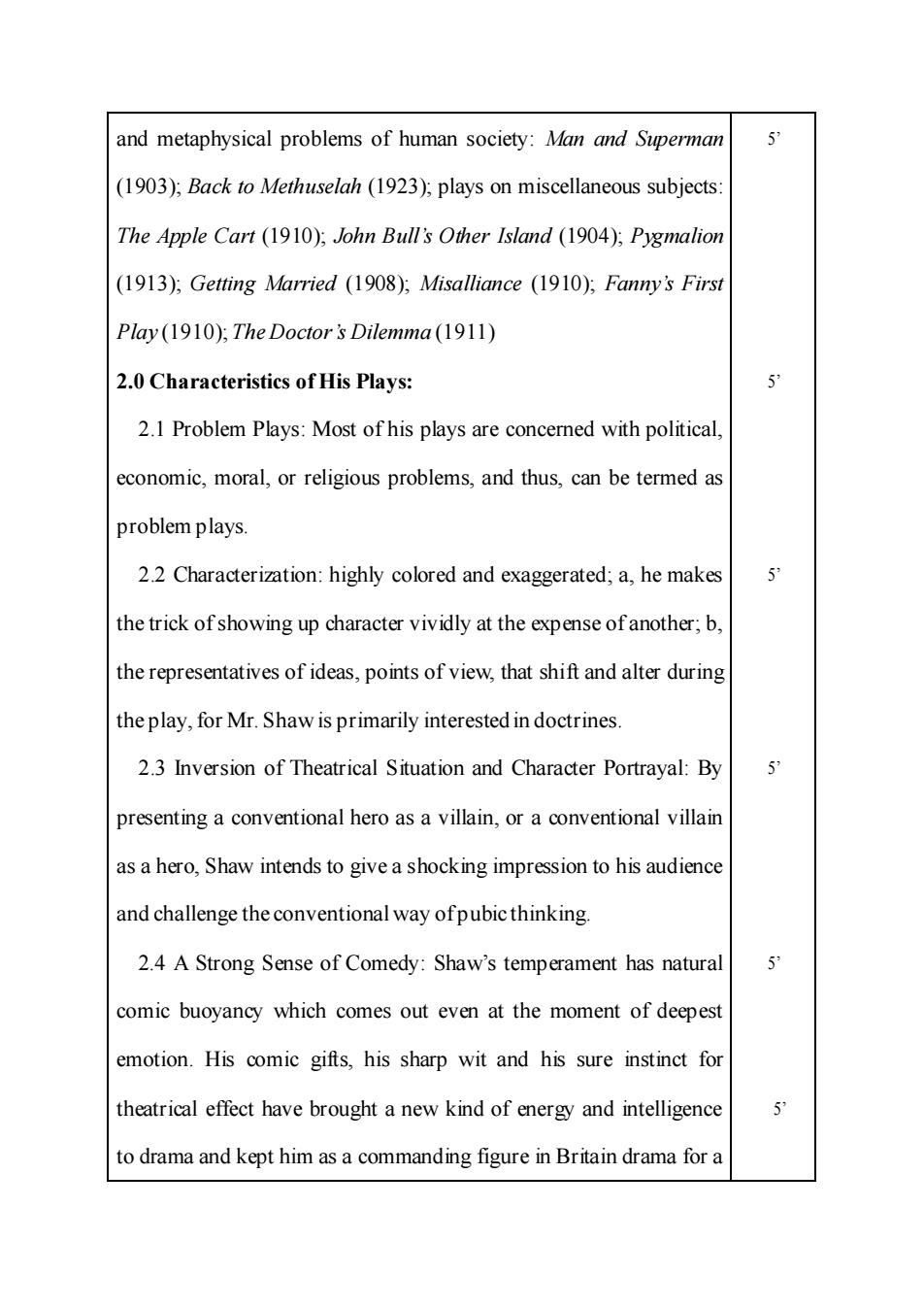
and metaphysical problems of human society:Man and Superman (1903);Back to Methuselah(1923);plays on miscellaneous subjects The Apple Cart (1910),John Bull's Other Island (1904),Pygmalion (1913),Getting Married (1908).Misalliance (1910).Fanny's Firs Play (1910);The Doctor's Dilemma(1911) 2.0 Characteristics of His Plays: 5 2.1 Problem Plays:Most of his plays are concerned with political. economic,moral,or religious problems,and thus,can be termed as problem plays. 2.2 Characterization:highly colored and exaggerated;a,he makes 5 the trick of showing up character vividly at the expense ofanother;b, the representatives of ideas,points of view,that shift and alter during the play,for Mr.Shaw is primarily interested in doctrines. 2.3 Inversion of Theatrical Situation and Character Portrayal:By presenting a conventional hero as a villain,or a conventional villain as a hero,Shaw intends to give a shocking impression to his audience and challenge the conventional way ofpubic thinking 2.4 A Strong Sense of Comedy:Shaw's temperament has natural 5 comic buoyancy which comes out even at the moment of deepest emotion.His comic gifs,his sharp wit and his sure instinct for theatrical effect have brought a new kind of energy and intelligence to drama and kept him as a commanding figure in Britain drama for a
and metaphysical problems of human society: Man and Superman (1903); Back to Methuselah (1923); plays on miscellaneous subjects: The Apple Cart (1910); John Bull’s Other Island (1904); Pygmalion (1913); Getting Married (1908); Misalliance (1910); Fanny’s First Play (1910); The Doctor’s Dilemma (1911) 2.0 Characteristics of His Plays: 2.1 Problem Plays: Most of his plays are concerned with political, economic, moral, or religious problems, and thus, can be termed as problem plays. 2.2 Characterization: highly colored and exaggerated; a, he makes the trick of showing up character vividly at the expense of another; b, the representatives of ideas, points of view, that shift and alter during the play, for Mr. Shaw is primarily interested in doctrines. 2.3 Inversion of Theatrical Situation and Character Portrayal: By presenting a conventional hero as a villain, or a conventional villain as a hero, Shaw intends to give a shocking impression to his audience and challenge the conventional way of pubic thinking. 2.4 A Strong Sense of Comedy: Shaw’s temperament has natural comic buoyancy which comes out even at the moment of deepest emotion. His comic gifts, his sharp wit and his sure instinct for theatrical effect have brought a new kind of energy and intelligence to drama and kept him as a commanding figure in Britain drama for a 5’ 5’ 5’ 5’ 5’ 5’
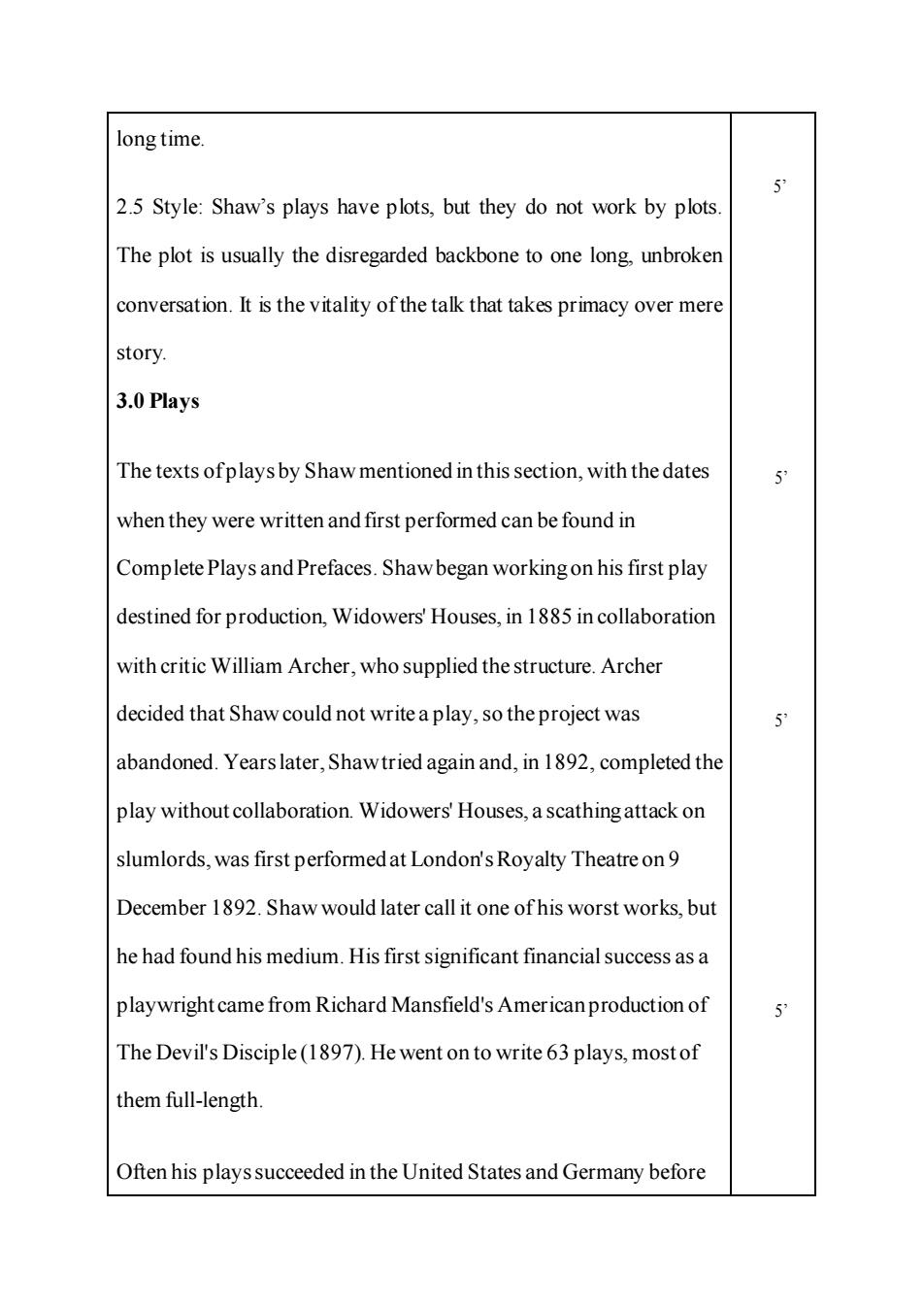
long time 5 2.5 Style:Shaw's plays have plots,but they do not work by plots The plot is usually the disregarded backbone to one long,unbroken conversation.It is the vitality of the talk that takes primacy over mere story. 3.0 Plays The texts ofplays by Shaw mentioned in this section,with the dates 5 when they were written and first performed can be found in Complete Plays and Prefaces.Shaw began working on his first play destined for production,Widowers'Houses,in 1885 in collaboratior with critic William Archer,who supplied the structure.Archer decided that Shaw could not writea play,so the project was 5 abandoned.Years later,Shawtried again and,in 1892,completed the play without collaboration.Widowers'Houses,a scathing attack on slumlords,was first performed at London's Royalty Theatre on9 December 1892.Shaw would later call it one ofhis worst works,but he had found his medium.His first significant financial success as a playwright came from Richard Mansfield's Americanproduction of 5” The Devil's Disciple(1897).He went on to write 63 plays,most of them full-length. Often his plays succeeded in the United States and Germany before
long time. 2.5 Style: Shaw’s plays have plots, but they do not work by plots. The plot is usually the disregarded backbone to one long, unbroken conversation. It is the vitality of the talk that takes primacy over mere story. 3.0 Plays The texts of plays by Shaw mentioned in this section, with the dates when they were written and first performed can be found in Complete Plays and Prefaces. Shaw began working on his first play destined for production, Widowers' Houses, in 1885 in collaboration with critic William Archer, who supplied the structure. Archer decided that Shaw could not write a play, so the project was abandoned. Years later, Shaw tried again and, in 1892, completed the play without collaboration. Widowers' Houses, a scathing attack on slumlords, was first performed at London's Royalty Theatre on 9 December 1892. Shaw would later call it one of his worst works, but he had found his medium. His first significant financial success as a playwright came from Richard Mansfield's American production of The Devil's Disciple (1897). He went on to write 63 plays, most of them full-length. Often his plays succeeded in the United States and Germany before 5’ 5’ 5’ 5’
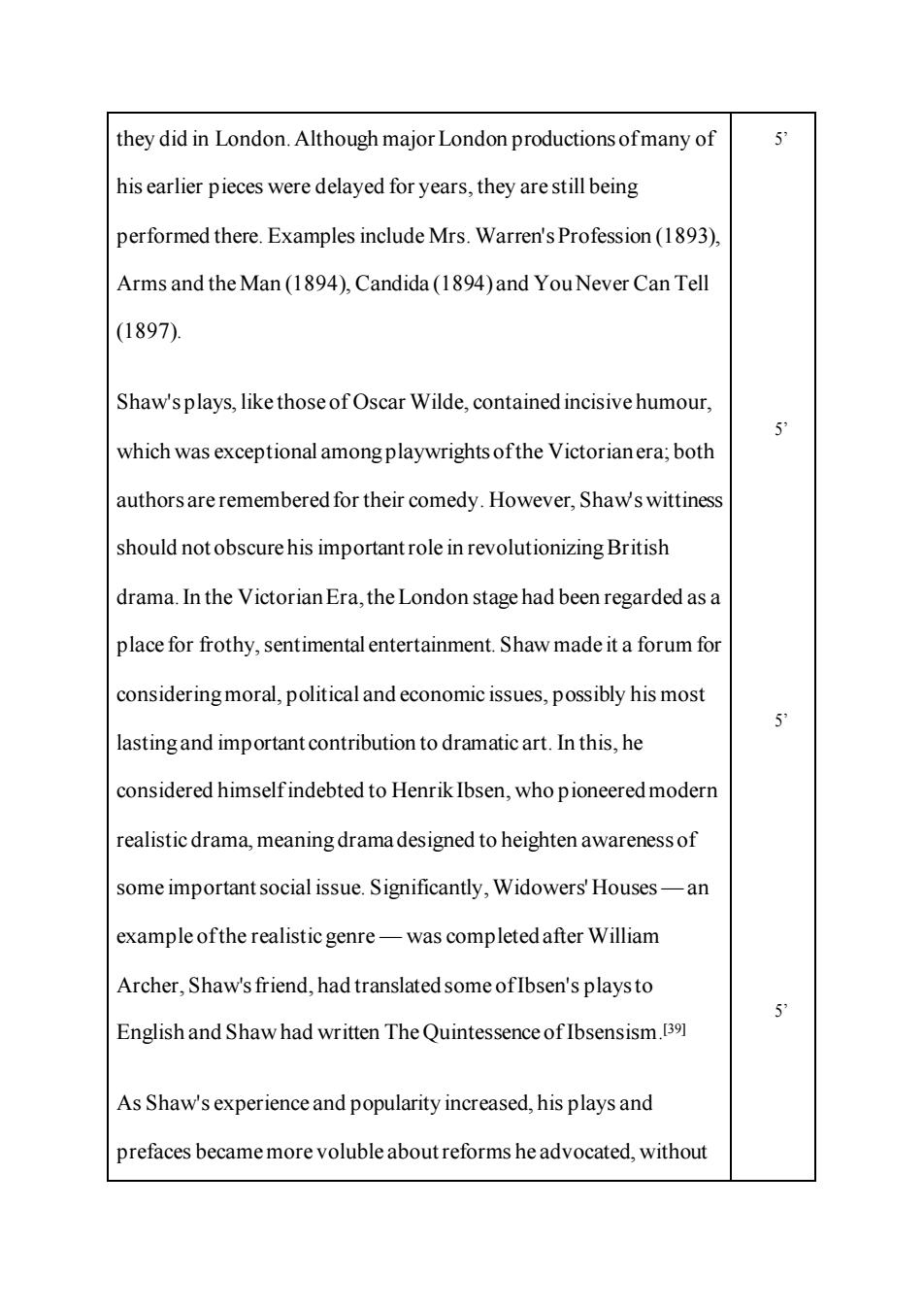
they did in London.Although major London productionsofmany of 5 his earlier pieces were delayed for years,they are still being performed there.Examples include Mrs.Warren's Profession(1893). Arms and the Man(1894),Candida(1894)and You Never Can Tell (1897). Shaw's plays,like those of Oscar Wilde,contained incisive humour 5 which was exceptional among playwrights ofthe Victorianera;both authors are remembered for their comedy.However,Shaws wittiness should not obscure his important role in revolutionizing British drama.In the Victorian Era,the London stage had been regarded as a place for frothy,sentimental entertainment.Shaw made it a forum for considering moral,political and economic issues,possibly his most 5 lasting and important contribution to dramatic art.In this,he considered himselfindebted to Henrik Ibsen,who pioneeredmodern realistic drama,meaning dramadesigned to heighten awarenessof some important social issue.Significantly,Widowers'Houses-an example ofthe realistic genre-was completed after William Archer,Shaw's friend,had translated some ofIbsen's playsto English and Shaw had written The Quintessence of Ibsensism.1391 As Shaw's experience and popularity increased,his plays and prefaces became more voluble about reforms he advocated,without
they did in London. Although major London productions of many of his earlier pieces were delayed for years, they are still being performed there. Examples include Mrs. Warren's Profession (1893), Arms and the Man (1894), Candida (1894) and You Never Can Tell (1897). Shaw's plays, like those of Oscar Wilde, contained incisive humour, which was exceptional among playwrights of the Victorian era; both authors are remembered for their comedy. However, Shaw's wittiness should not obscure his important role in revolutionizing British drama. In the Victorian Era, the London stage had been regarded as a place for frothy, sentimental entertainment. Shaw made it a forum for considering moral, political and economic issues, possibly his most lasting and important contribution to dramatic art. In this, he considered himself indebted to Henrik Ibsen, who pioneered modern realistic drama, meaning drama designed to heighten awareness of some important social issue. Significantly, Widowers' Houses —an example of the realistic genre — was completed after William Archer, Shaw's friend, had translated some of Ibsen's plays to English and Shaw had written The Quintessence of Ibsensism. [39] As Shaw's experience and popularity increased, his plays and prefaces became more voluble about reforms he advocated, without 5’ 5’ 5’ 5’
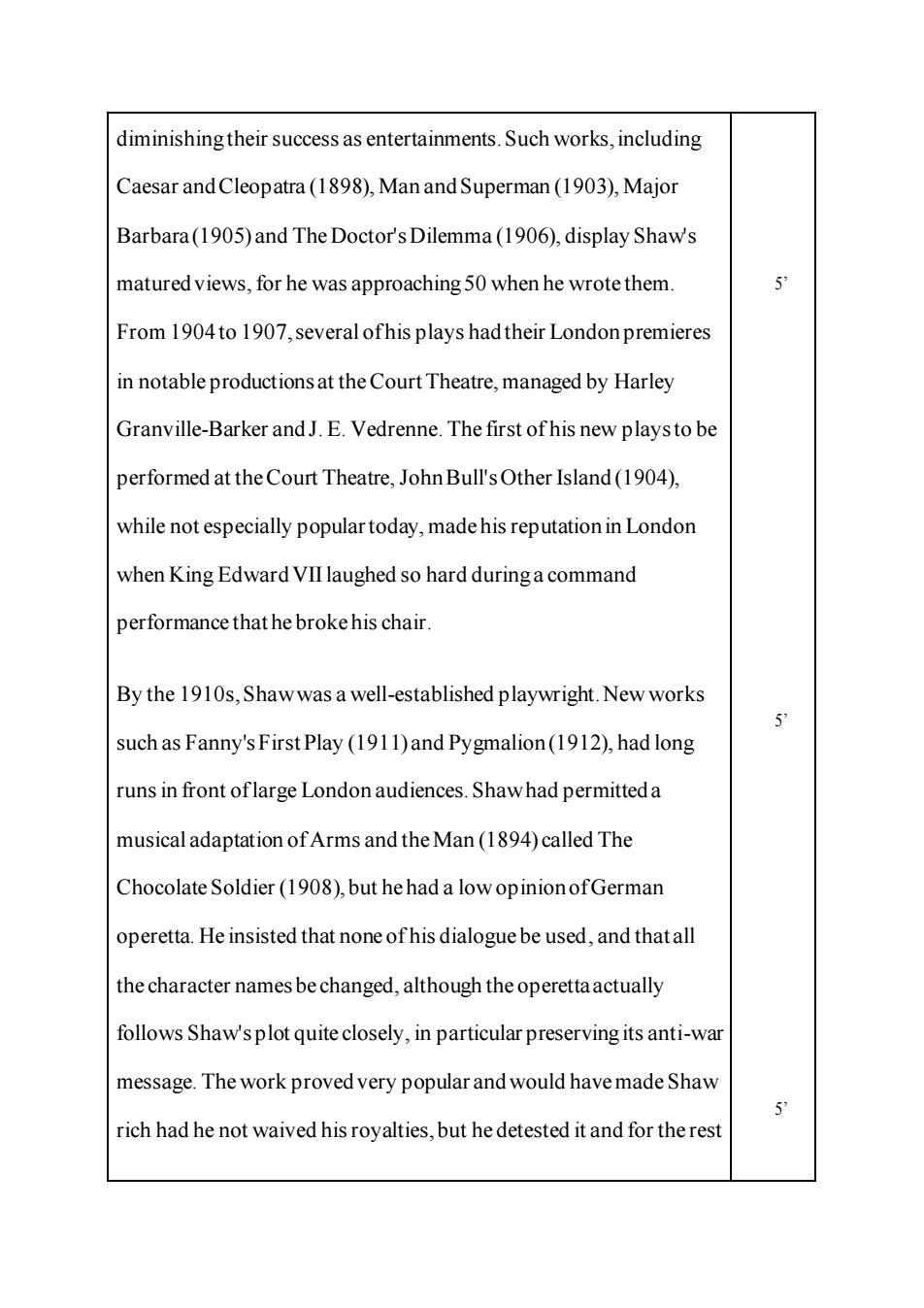
diminishingtheir successas entertainments.Such works,including Caesar and Cleopatra(1898),Man and Superman(1903),Major Barbara(1905)and The Doctor's Dilemma(1906),display Shaws matured views,for he was approaching 50 when he wrote them 5 From 1904 to 1907,several ofhis plays had their London premieres in notable productions at the Court Theatre,managed by Harley Granville-Barker andJ.E.Vedrenne.The first ofhis new playsto be performed at the Court Theatre,John Bull's Other Island(1904), while not especially populartoday,made his reputaioninLondon when King Edward VII laughed so hard duringa command performance that he broke his chair. By the 1910s,Shawwas a well-established playwright.New works 5 such as Fanny's First Play(1911)and Pygmalion(1912),had long runs in front oflarge London audiences.Shawhad permitted a musical adaptation of Arms and the Man(1894)called The Chocolate Soldier(1908),but he had a low opinion ofGerman operetta.He insisted that none ofhis dialogue be used,and thatall the character names be changed,although the operettaactually follows Shaw's plot quite closely,in particular preserving its anti-war message.The work proved very popular and would have made Shaw 5 rich had he not waived his royalties,but he detested it and for the rest
diminishing their success as entertainments. Such works, including Caesar and Cleopatra (1898), Man and Superman (1903), Major Barbara (1905) and The Doctor's Dilemma (1906), display Shaw's matured views, for he was approaching 50 when he wrote them. From 1904 to 1907, several of his plays had their London premieres in notable productions at the Court Theatre, managed by Harley Granville-Barker and J. E. Vedrenne. The first of his new plays to be performed at the Court Theatre, John Bull's Other Island (1904), while not especially popular today, made his reputation in London when King Edward VIIlaughed so hard during a command performance that he broke his chair. By the 1910s, Shaw was a well-established playwright. New works such as Fanny's First Play (1911) and Pygmalion (1912), had long runs in front of large London audiences. Shaw had permitted a musical adaptation of Arms and the Man (1894) called The Chocolate Soldier (1908), but he had a low opinion of German operetta. He insisted that none of his dialogue be used, and that all the character names be changed, although the operetta actually follows Shaw's plot quite closely, in particular preserving its anti-war message. The work proved very popular and would have made Shaw rich had he not waived his royalties, but he detested it and for the rest 5’ 5’ 5’